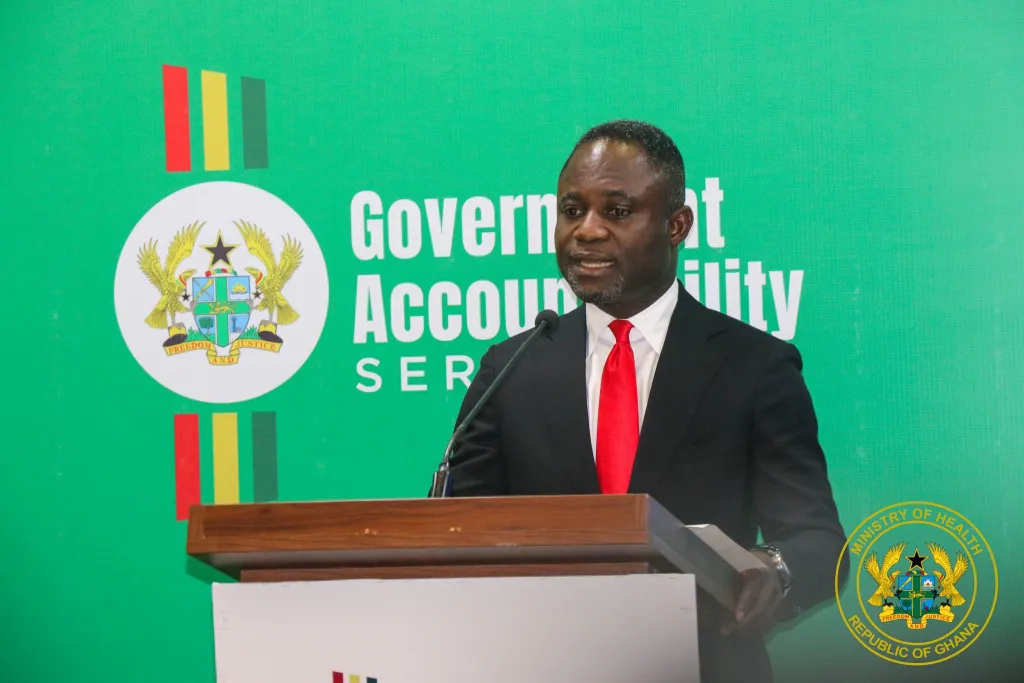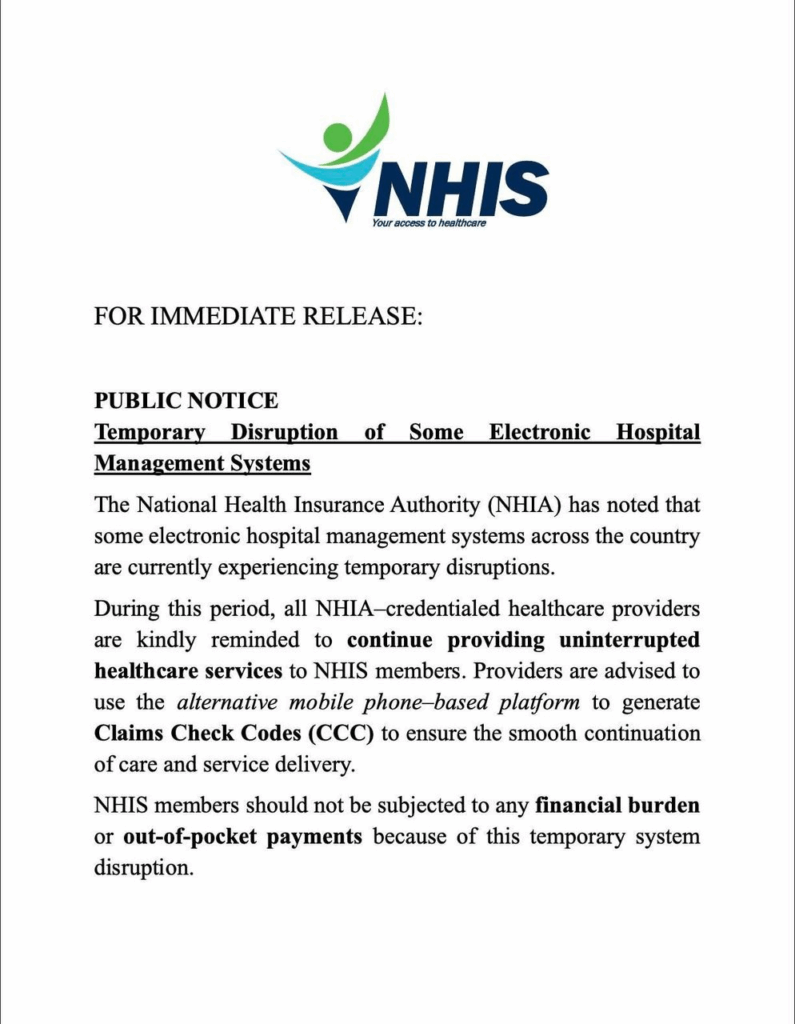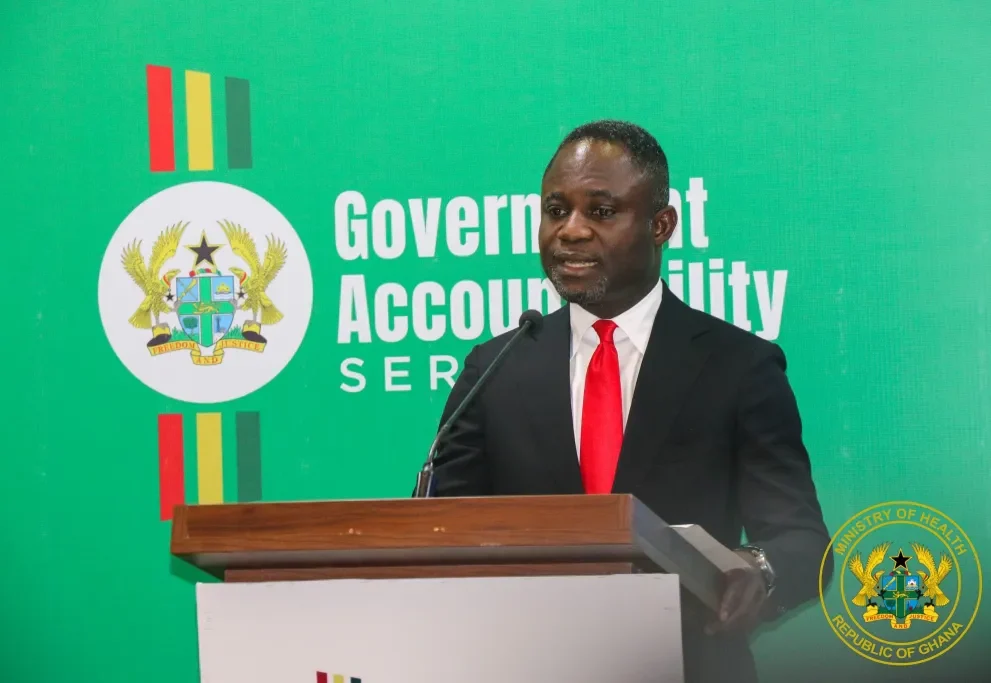The Ministry of Health has announced the rollout of a new digital system designed to stabilize and improve the operations of the National Health Insurance Scheme (NHIS) after recent disruptions to its electronic platform. The announcement comes in response to widespread concerns from both healthcare providers and patients who had experienced difficulties accessing services due to technical failures in the existing system.
According to the Ministry, the disruptions had caused significant delays in processing claims and verifying patient information, leading to frustration among stakeholders. In a statement, the Ministry explained that the new system was developed to “ensure continuity of service delivery and restore confidence in the NHIS platform”. Officials emphasized that the transition to the new system was not merely a temporary fix but part of a broader digital transformation agenda aimed at strengthening Ghana’s healthcare infrastructure.
The Health Minister, Honorable Kwabena Akandoh, addressed the media during the launch of the system, assuring the public that the government was committed to resolving the challenges that had plagued the NHIS platform. “We recognize the inconvenience caused to patients and providers during the period of disruption,” he said. “This new digital system has been carefully designed to provide stability, improve efficiency, and enhance the overall experience for all users of the NHIS”.
Healthcare providers, who had been among the most affected by the disruptions, welcomed the announcement but also expressed cautious optimism. Many hospitals and clinics had reported difficulties in verifying patient eligibility, which in turn delayed treatment and created bottlenecks in service delivery. The Ghana Medical Association noted that while the new system was a positive development, its success would depend on consistent maintenance and technical support.
The Ministry highlighted several features of the new platform, including improved data security, faster processing times, and a more user-friendly interface for both providers and patients. Officials also revealed that the system had been tested in selected districts before its nationwide rollout, with feedback from healthcare workers incorporated into the final design. This, they said, was part of the government’s effort to ensure that the system was responsive to the needs of those who use it most frequently.

In addition to addressing the immediate challenges, the Ministry framed the new system as part of a larger vision for digital health in Ghana. Honorable Mintah Akandoh further explained that, the government was working toward a fully integrated health information system that would connect hospitals, clinics, pharmacies, and insurance providers. “Our goal is to build a health system that is not only resilient but also adaptive to the changing needs of our population,” he stated.
Patients, meanwhile, have expressed relief at the news of the new system. Many had been forced to pay out-of-pocket for services during the disruptions, with the expectation of later reimbursement. For low-income families, this created significant financial strain. Civil society groups advocating for healthcare access have urged the Ministry to ensure that such disruptions do not recur, stressing that the NHIS is a lifeline for millions of Ghanaians who rely on it for affordable healthcare.
The rollout of the new system also comes at a time when Ghana is seeking to expand coverage under the NHIS. The government has pledged to increase enrollment, particularly among rural populations and informal sector workers who remain underrepresented in the scheme. Officials believe that a more reliable digital platform will help achieve this goal by making registration and verification processes smoother and more accessible.
Technology experts have also weighed in on the development, noting that while the new system represents progress, it must be supported by adequate infrastructure. Issues such as internet connectivity, especially in rural areas, remain a challenge. Without addressing these broader structural concerns, they argue, even the most advanced digital systems may struggle to deliver their full potential.
The Ministry has assured the public that it will continue to monitor the performance of the new system closely and make adjustments as needed. Training programs for healthcare workers are also being rolled out to ensure that providers are able to use the platform effectively. In addition, the Ministry has pledged to maintain open communication with stakeholders, promising regular updates on the system’s performance and any improvements made.

In the broader context, the launch of this new digital system reflects Ghana’s ongoing efforts to modernize its healthcare sector. Over the past decade, the government has invested in various initiatives aimed at improving access, efficiency, and quality of care. The NHIS, in particular, has been a cornerstone of these efforts, providing millions of Ghanaians with access to essential health services. However, the scheme has also faced persistent challenges, including funding constraints, administrative inefficiencies, and technological setbacks.
The recent disruptions to the NHIS platform served as a stark reminder of the vulnerabilities within the system. For many, the rollout of the new digital platform represents not just a technical upgrade but a renewed commitment to addressing these vulnerabilities. As Honorable Akandoh remarked, “This is about more than fixing a system. It is about building trust, ensuring accountability, and delivering on our promise of accessible healthcare for all Ghanaians”.
Looking ahead, the success of the new system will depend on a combination of factors: sustained government investment, effective technical support, and the active participation of healthcare providers and patients. If these elements come together, the new digital platform could mark a turning point for the NHIS, transforming it into a more reliable and efficient mechanism for delivering healthcare.
For now, the rollout has been met with cautious optimism. Patients and providers alike are hopeful that the new system will deliver on its promises and prevent a repeat of the disruptions that caused so much difficulty in recent months. The Ministry’s commitment to transparency and stakeholder engagement will be critical in maintaining this optimism and ensuring that the NHIS continues to serve as a vital pillar of Ghana’s healthcare system.



